When recently traveling to Berlin, I used the opportunity to visit Potsdam, the capital of the State of Brandenburg. This city in my mind was mostly the place of Sanssouci Palace, but there is much more to it. So if you have an opportunity to visit it in spring, summer or autumn, do it. This is a time when you can see its parks at their best. But even if you come to Berlin at any other time of the year, still go and see Potsdam. The city of Potsdam is known especially as having once been the favourite residence of the Prussian kings (in the 18th and 19th centuries) but it was more than 1000 years ago when Potsdam was first mentioned in a document. In the early 18th century, the "Soldier King" Frederick William I increased the population by bringing military battalions into the town. At that time each family was required to house from 2-6 soldiers in their attic rooms. When Frederick the Great assumed the throne, he built Sanssouci Palace and also the largest of Potsdam's palaces, the New Palace, in the middle of the 18th century.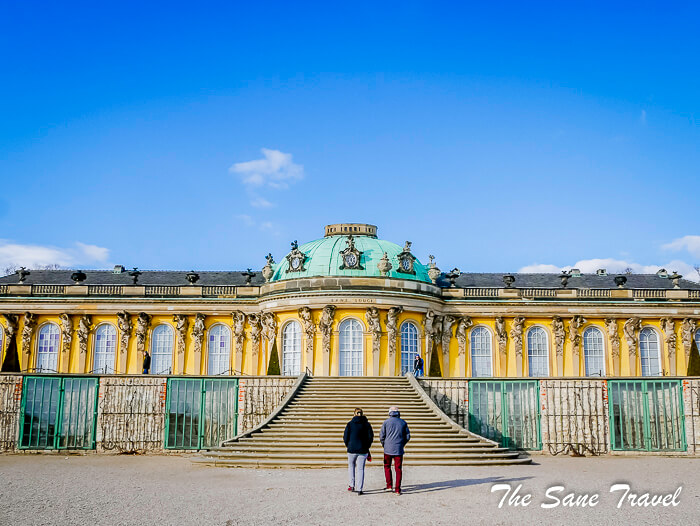
In the 19th century, renowned landscape architect Peter Joseph Lenné unified the palaces and the gardens into a harmonious landscape.
In 1990, the Potsdam-Berlin park landscape was inscribed on the UNESCO heritage list. Since then, UNESCO World Cultural site “Palaces and Parks of Potsdam and Berlin” has been enlarged twice. In 1992, Sacrow Palace and Park was added. Additional areas were integrated in 1999, including Alexandrowka Russian colony. Today the area of this UNESCO heritage site is over 2,000 hectares.
So let’s begin exploring Potsdam from its heart: the Old market square. You will be immediately attracted by the building of St.Nicolas church.
St Nicolas church
St. Nicholas’ Church at the Old Market is the largest church in Potsdam. The Classicist Evangelical Church with its great dome was originally designed by Karl Friedrich Schinkel. Its concept included a large dome that was inspired by St. Paul's Cathedral in London. The building was completed in 1850. During World War II, the church was badly damaged in the bombing of Potsdam. After WWII, the church was largely restored to its original state again and it was re-consecrated in 1981. The rebuilt dome has a diameter of 24 meters and a height of 13 meters, and the impressive interior is 52 meters high. You can climb the Dome for great views over the city or enjoy concerts in the church.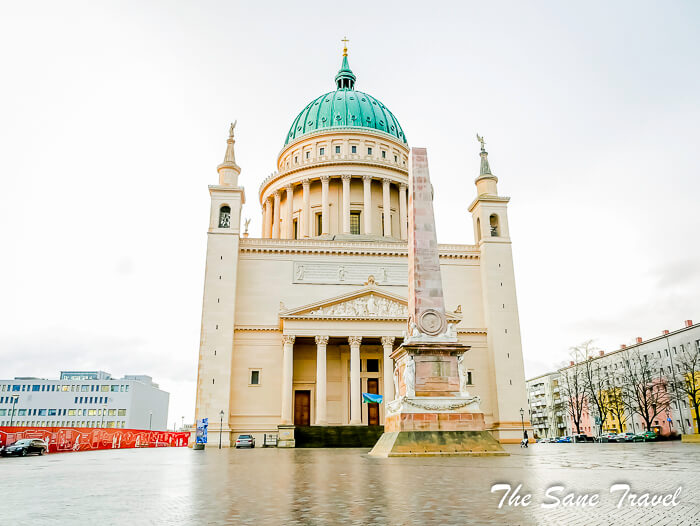
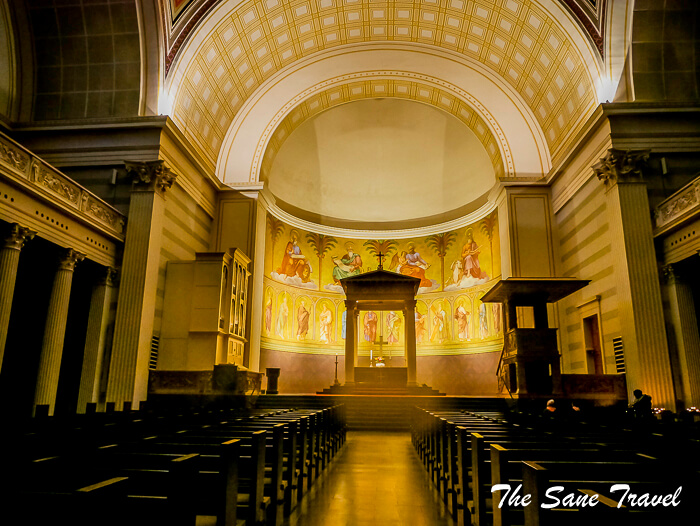
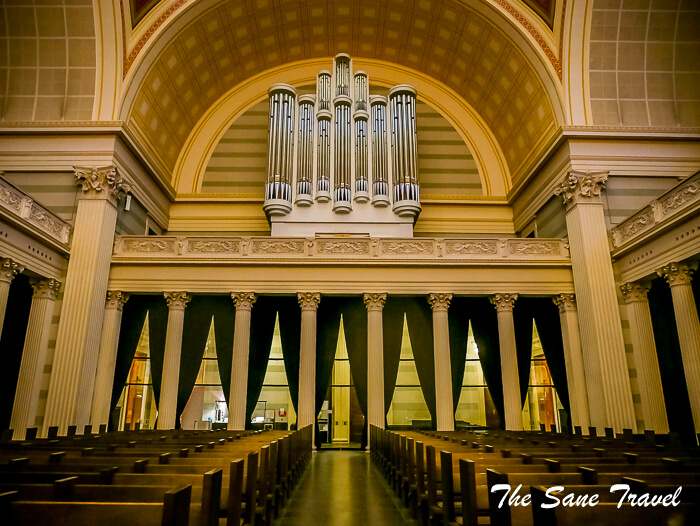
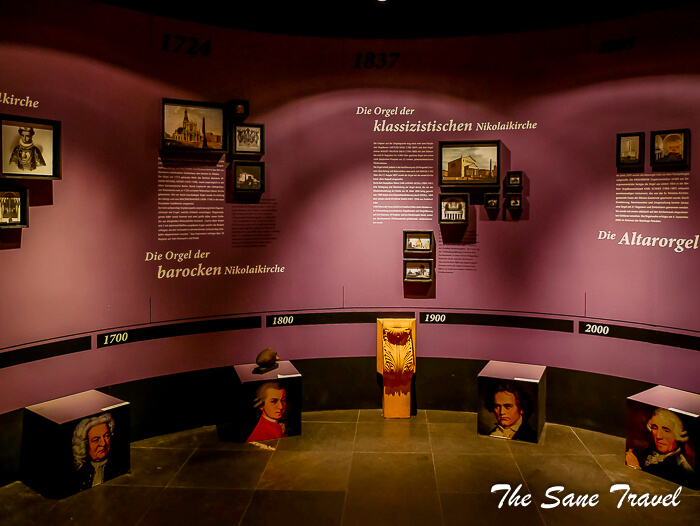 Then turn to the building of Barberini Museum.
Then turn to the building of Barberini Museum.
Barberini Museum
The Museum Barberini in the reconstructed palace is located on the square Alte Markt near the Stadtschloss (City Palace) where the Brandenburg Parliament meets. Built at the end of 18th century, the Palais Barberini was heavily damaged during an air raid in 1945 and because of that was demolished in 1948. From 2013 to 2016, the building was reconstructed as an art museum, designed with its historic façade and a modern interior. With the Museum Barberini, the city of Potsdam has gained an excellent new art venue. Centered on works from the collection of its founder and patron Hasso Plattner, the Barberini presents three temporary exhibitions per year, featuring loans from international museums and private collections. Check what is offered and pop in to see the artworks.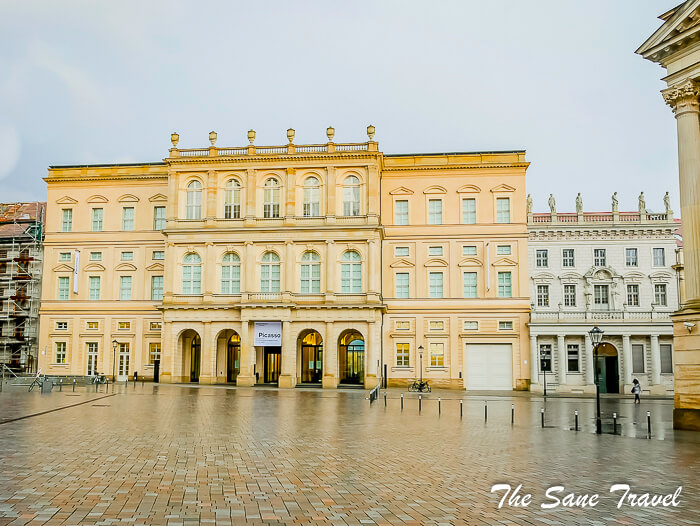 Then walk into the yard of the Brandenburg parliament building.
Then walk into the yard of the Brandenburg parliament building.
Brandenburg parliament building
This is a place of the oldest settlements in Potsdam. A number of fortifications, fortresses and castles had been there until Great Elector Frederick William had a new palace built in the second part of the 17th century. The palace was used as a residence until the end of the First World War. The palace is now transformed into an integral part of urban life. A donation of 20 million euros was made by the Hasso Plattner Foundation to the Land of Brandenburg to ensure that the Parliament (Landtag) building conformed as far as possible to the structure and appearance of the facade of the Potsdam city palace. This allowed the outside of the building to be restored in accordance with historic plans, measurements and photographs. It was interesting to notice that sign at the Parliament building was in two languages: German and also Lower Sorbian a Slavic minority language spoken in part of Brandenburg state.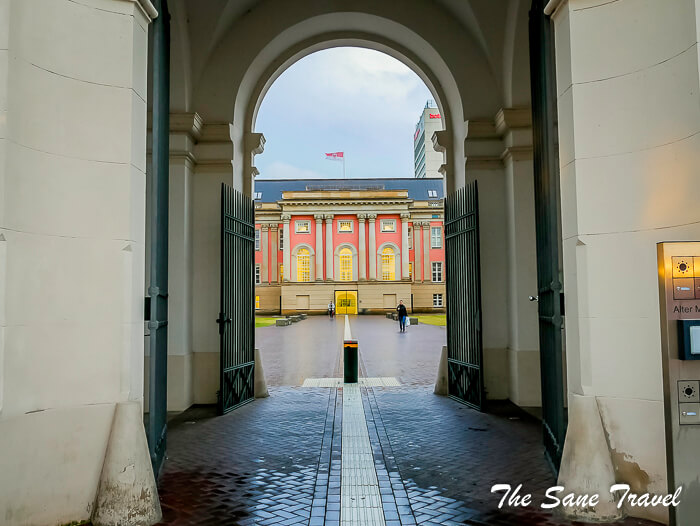
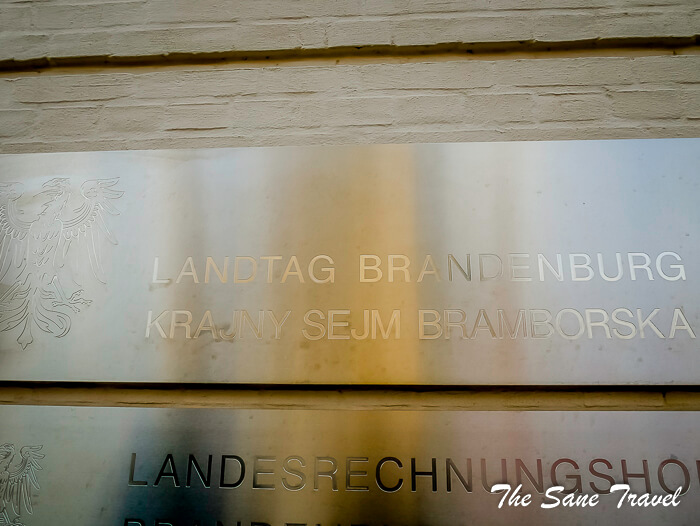
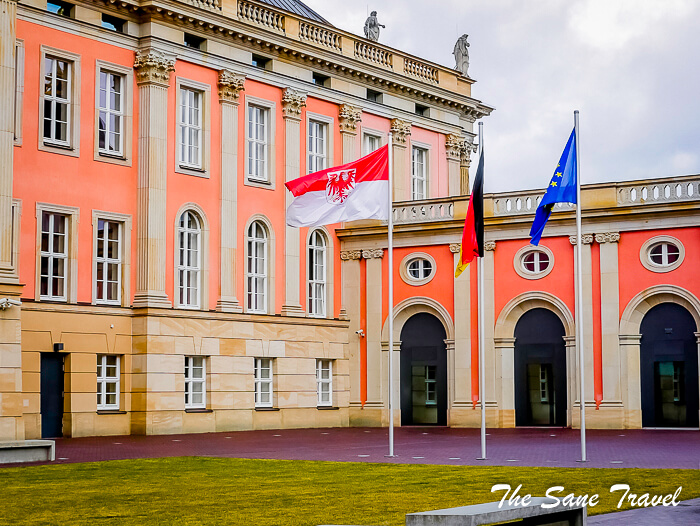
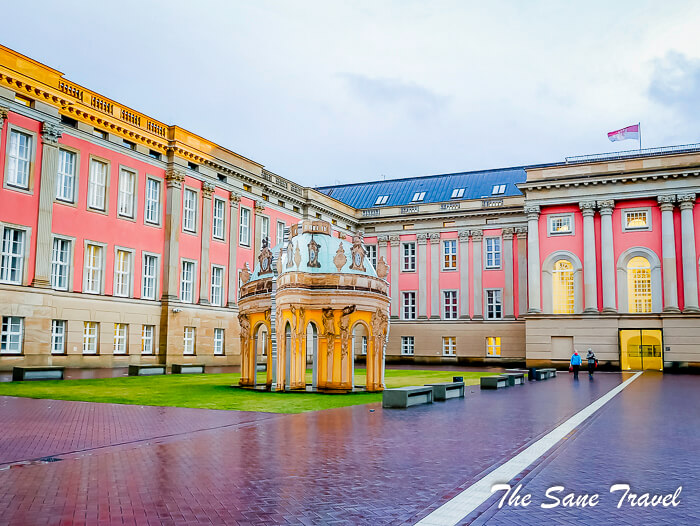 Then walk to the nearby Film Museum.
Then walk to the nearby Film Museum.
Film Museum
This oldest film museum in Germany is located in the heart of Brandenburg's capital, so you can go behind the scenes of film and cinema. In a magnificent baroque building, stars of the silver screen shine. The museum shows the long history of the Babelsberg film studios, the oldest film factory in the world located next to Potsdam. The building of the current museum was built as an orangery at the end of the 17th century next to the Potsdam City Palace. It became a horse stable later. It was converted to a film museum in the 70s of 20th century.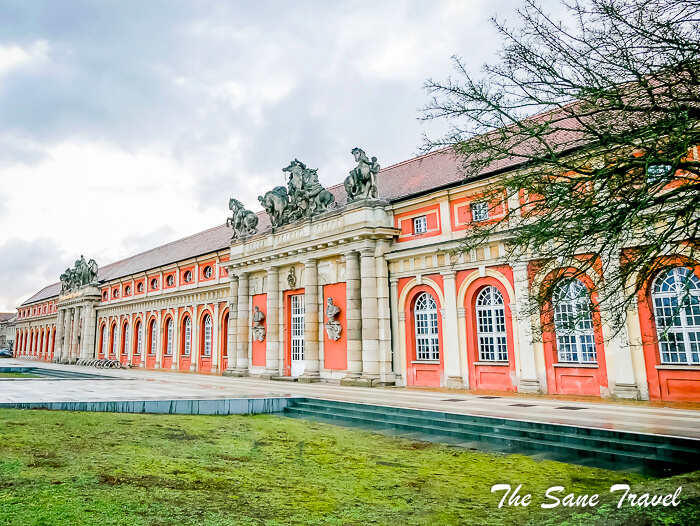
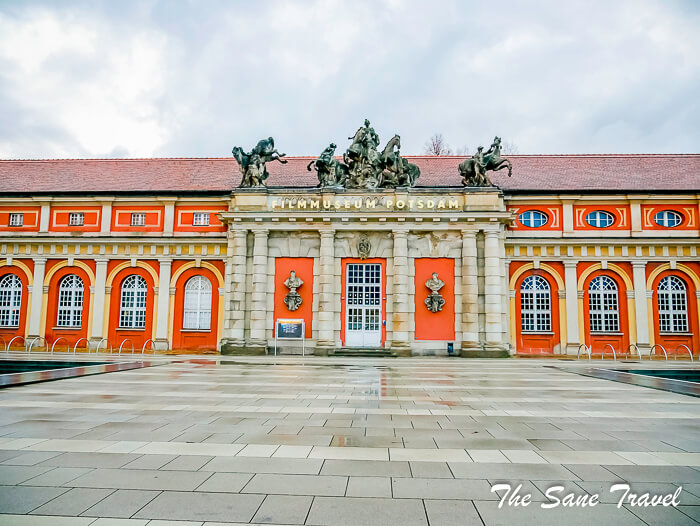 After admiring this beautiful building and its exhibits, walk to the Dutch quarter.
After admiring this beautiful building and its exhibits, walk to the Dutch quarter.
Dutch quarter
Much of Potsdam was the swampland in the early 18th century so the king sought experts in construction on marshy soil - the Dutch. With the construction of the famous Dutch Quarter, he hoped to attract Dutch immigrants, but he did not succeed fully. In addition to the promised privileges, the willing Dutch settlers had to find dwellings that were modelled on those of their homeland. There are exactly 134 red two-storey brick houses, arranged in four squares. They make up the largest Dutch housing development outside the Netherlands. You can find arts and crafts shops, galleries, workshops, and cosy cafés there, and also two museums. There are three major festivals a year in the Dutch quarter – the tulip festival in April, the potters’ market in September and the Dutch Christmas market in the advent time.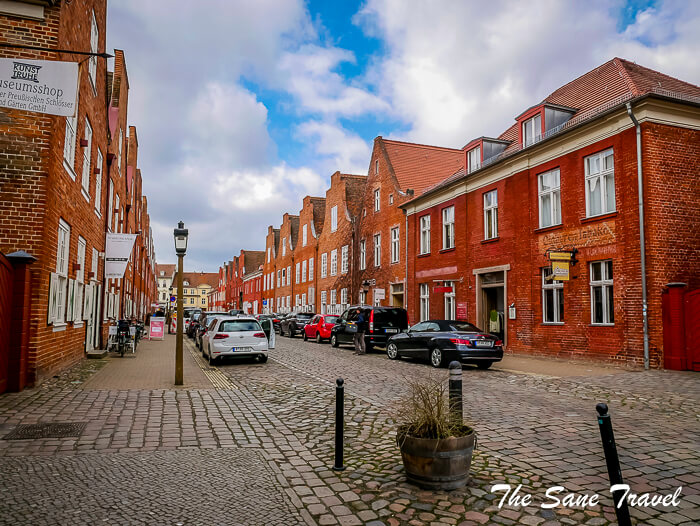
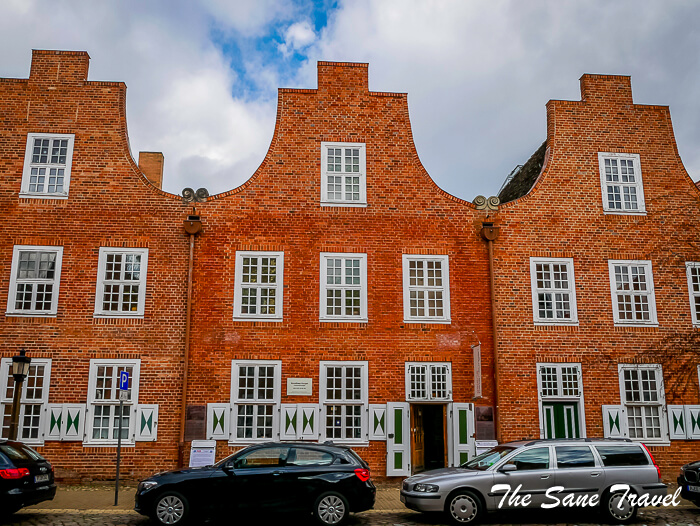 When walking the Dutch quarter, notice the sign on the building at Mittelstrasse 3. It marks the place where the Captain of Köpenick (Friedrich Wilhelm Voigt) purchased his uniform from second-hand dealer Bertold Remlinter. Using it in 1906, he pretended to be a Prussian military officer, and with a number of soldiers under his "command" he "confiscated" more than 4,000 marks from a municipal treasury. Although he served two years in prison, he became a folk hero as The Captain of Köpenick.
When walking the Dutch quarter, notice the sign on the building at Mittelstrasse 3. It marks the place where the Captain of Köpenick (Friedrich Wilhelm Voigt) purchased his uniform from second-hand dealer Bertold Remlinter. Using it in 1906, he pretended to be a Prussian military officer, and with a number of soldiers under his "command" he "confiscated" more than 4,000 marks from a municipal treasury. Although he served two years in prison, he became a folk hero as The Captain of Köpenick.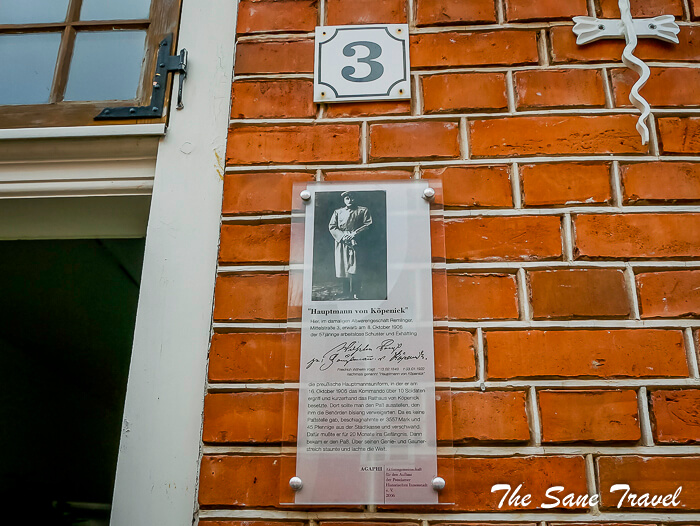 Then continue your way to the Russian colony Alexandrowka.
Then continue your way to the Russian colony Alexandrowka.
Russian colony Alexandrowka
Alexandrowka is located in northern Potsdam. It consists of 13 wooden houses that were built in the early 19th century in Russian style at the request of the Prussian King, Friedrich Wilhelm III. The colony was built on the model of the park village of Glasovo near St. Petersburg. It served as a home for the Russian singers of the first Prussian guards regiment. "Russian Singer Choir" entertained the Prussian army with "song and tambourine and little bells". According to the will of the king, the Russian singers were allowed to move into the houses only when they were married. The houses could not be sold and could be inherited only in the direct male line. Therefore, many houses fell back to the king. After 100 years, just 4 of the houses were inhabited by direct descendants of the singers, including the 7th generation of the Anisimoff family.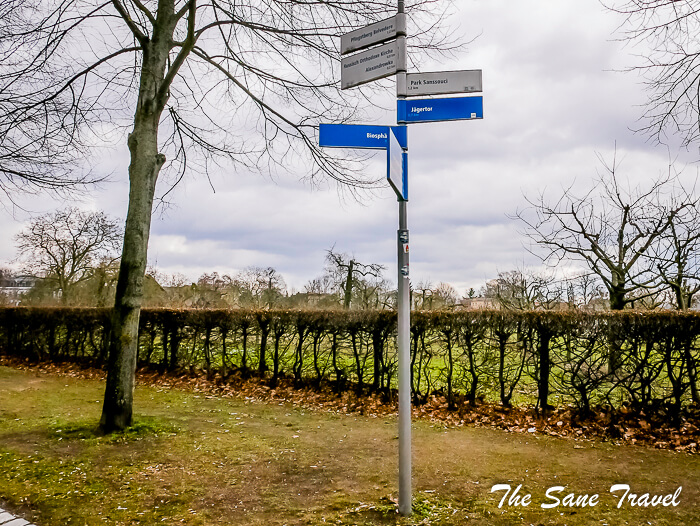
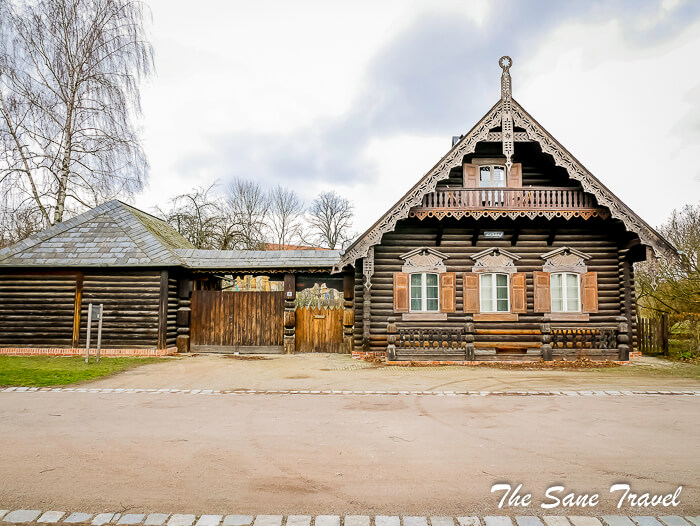
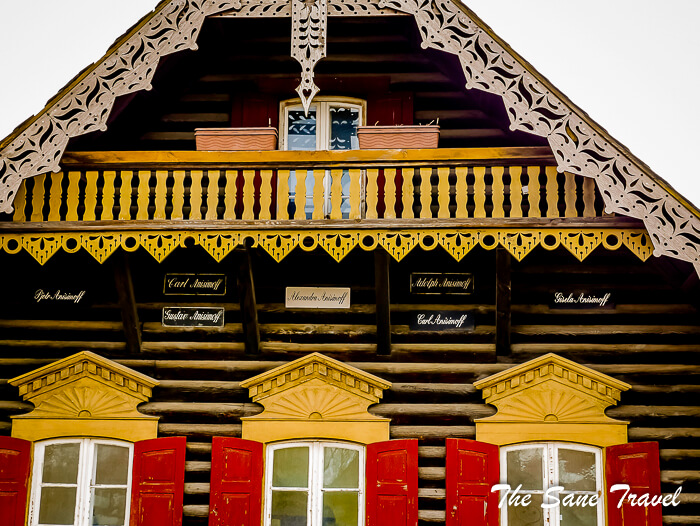
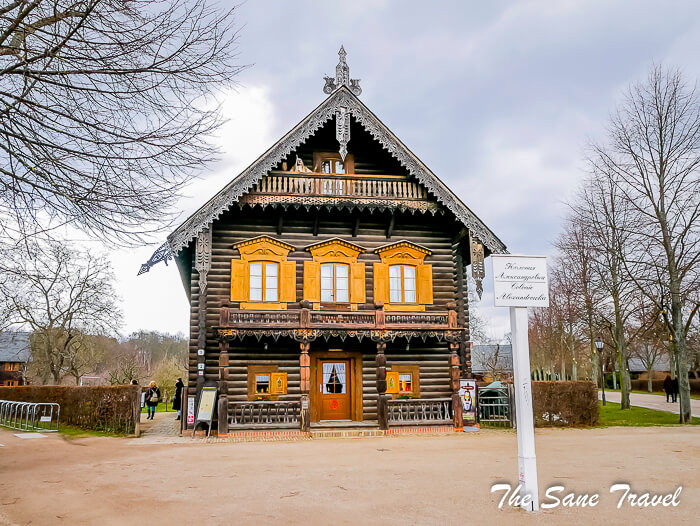 The Russian village of Alexandrowka is unique and since 1999 it has been a part of the UNESCO World Heritage site. There are a museum and restaurant in the colony, so maybe you would want to stay longer. Then continue your way to the Cecilienhof Palace.
The Russian village of Alexandrowka is unique and since 1999 it has been a part of the UNESCO World Heritage site. There are a museum and restaurant in the colony, so maybe you would want to stay longer. Then continue your way to the Cecilienhof Palace.
Cecilienhof Palace
Cecilienhof Palace in the New Garden was the last Hohenzollern palace, built for the crown prince Wilhelm during the years 1913-1917. The prince and his wife Cecilie – after whom it was named – opted for the style of an English country house. The 176 rooms include a smoking lounge, a library, a music salon and a room designed like a cabin on an ocean liner. The interior design is characterised by its simplicity and elegance, with plenty of wood.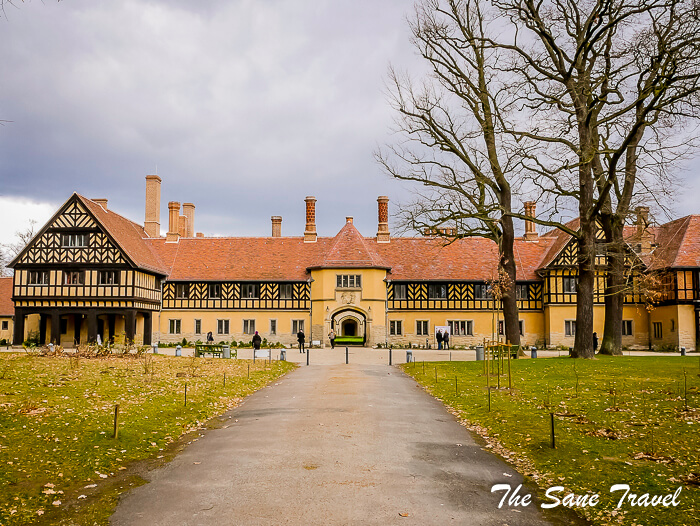
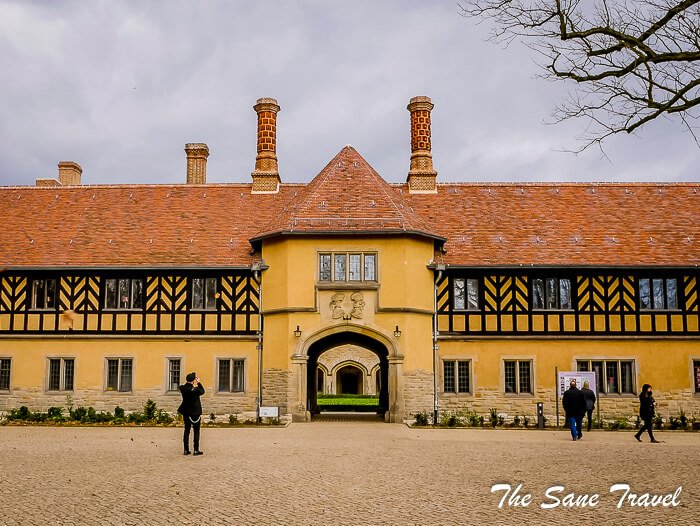
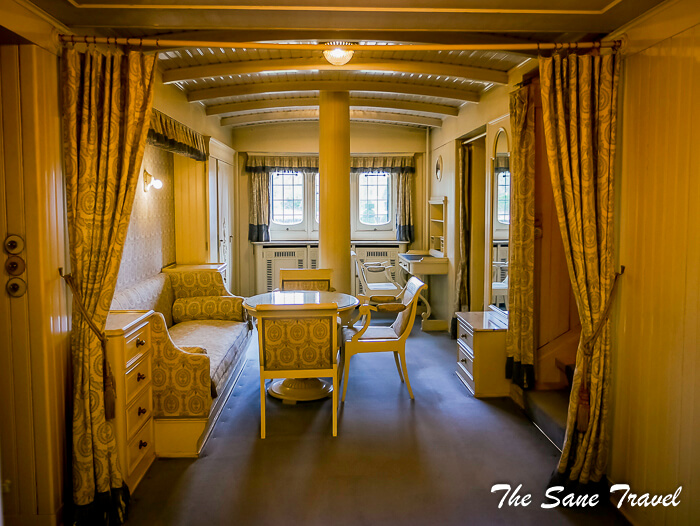 Crown Prince Wilhelm and his wife Cecilie lived there until they fled in 1945. After that, the area of the New Garden, including the palace, was closed for many years and was used for military purposes of the Soviet Army.
Crown Prince Wilhelm and his wife Cecilie lived there until they fled in 1945. After that, the area of the New Garden, including the palace, was closed for many years and was used for military purposes of the Soviet Army.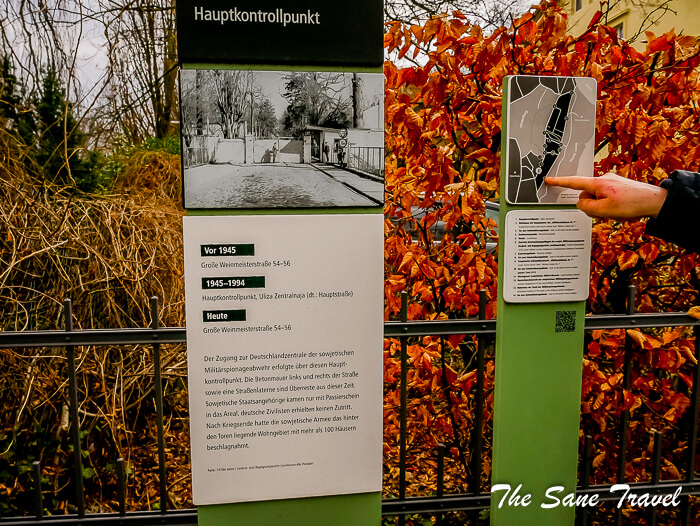 When walking around in the park, notice an interesting summer kitchen building and also the building of the former dairy.
When walking around in the park, notice an interesting summer kitchen building and also the building of the former dairy.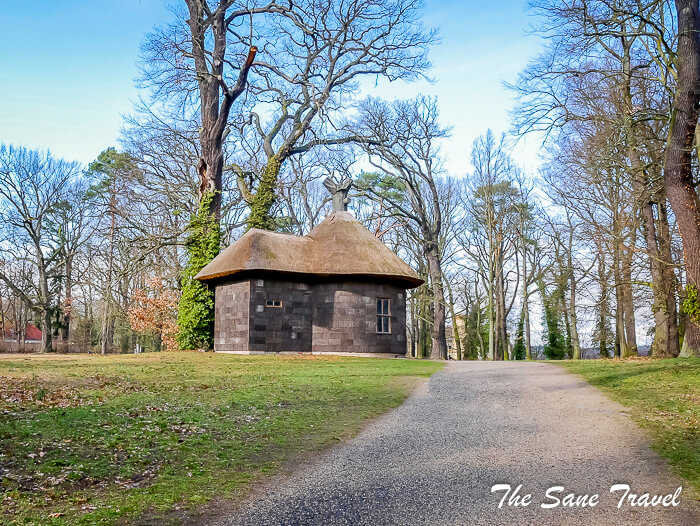
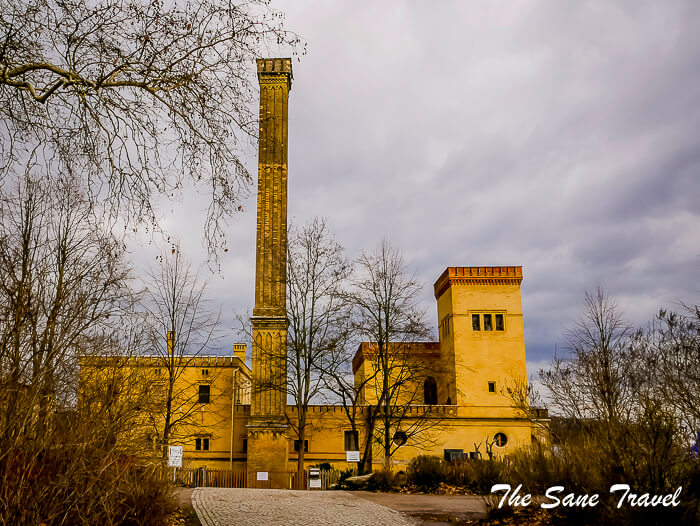
The Potsdam Conference
After WWII ended, from the end of July until the beginning of August 1945 the Potsdam Agreement was negotiated and signed between Churchill, Truman, and Stalin in Cecilienhof Palace. Each of the “Big Three” was given their own room with its own furniture.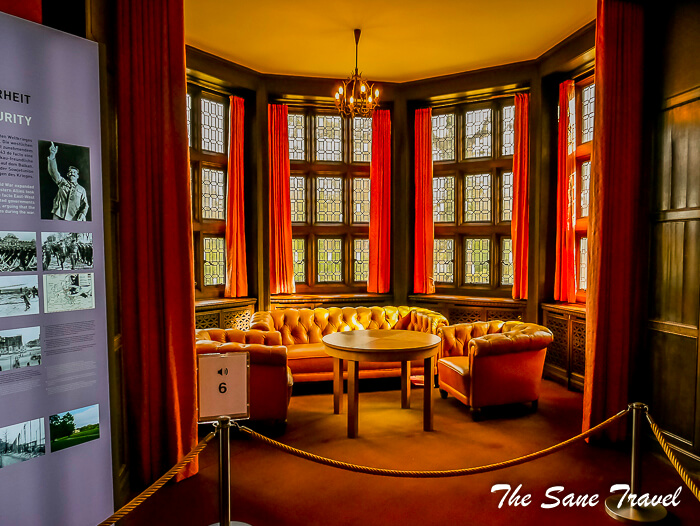 The great hall of the palace was converted into a conference room with a round table.
The great hall of the palace was converted into a conference room with a round table.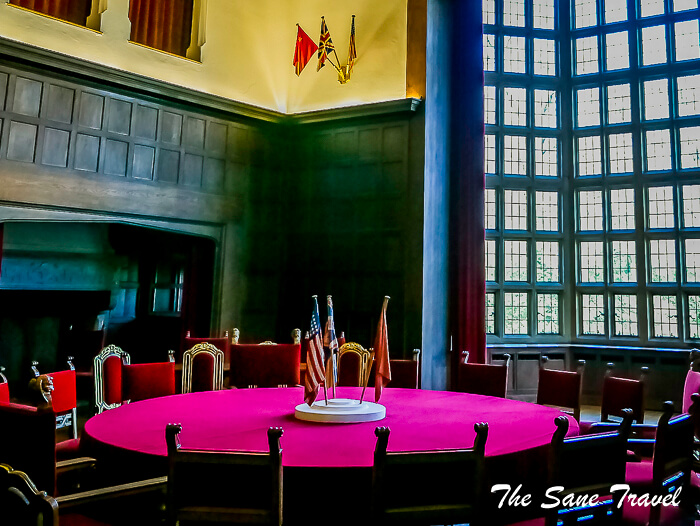
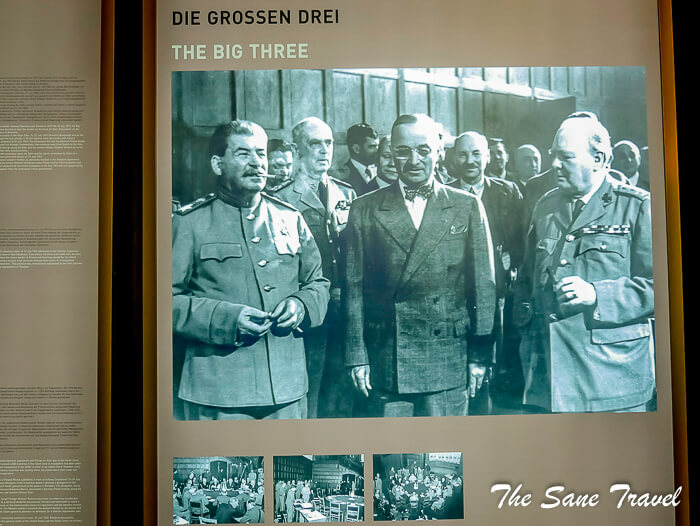 As the 75th anniversary of this event is approaching, there is one more good reason to visit Cecilienhof. After learning about this important event of the history, head to Palace Sanssouci.
As the 75th anniversary of this event is approaching, there is one more good reason to visit Cecilienhof. After learning about this important event of the history, head to Palace Sanssouci.
Palace Sanssouci
The most visited attraction in Potsdam is the Palace Sanssouci. It was built in the middle of the 18th century when King Frederick the Great commissioned Rococo style Sanssouci Palace to be built as his summer residence. The last royal resident of Palace Sanssouci was the widow of Frederick William IV. Then the palace was converted into a museum and opened to the public in 1927. Frederick’s desire to be buried in the Palace Sanssouci was finally honoured in 1991, on the 205th anniversary of his death. With some 70km of walkways, Park Sanssouci is the largest park in Brandenburg. Its uniqueness attracts over a million tourists each year.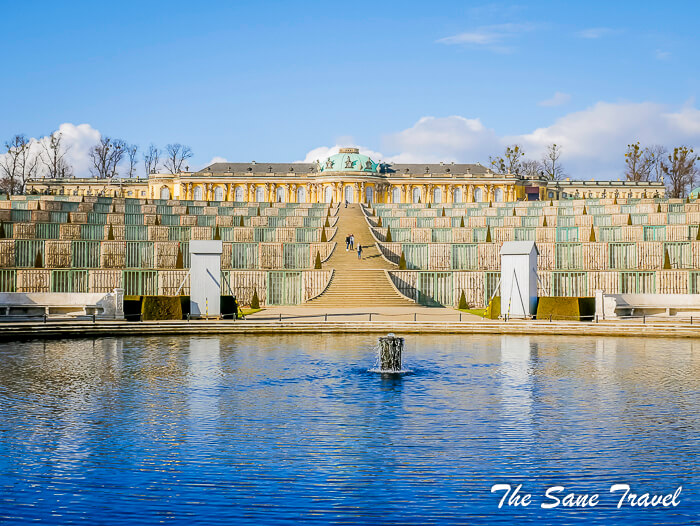

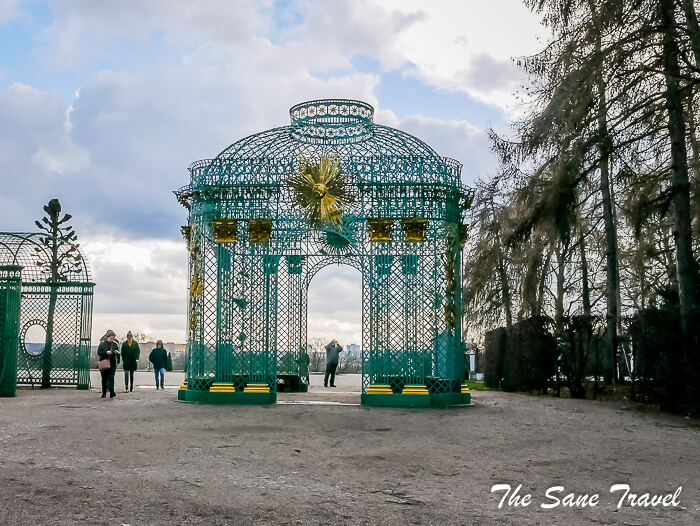
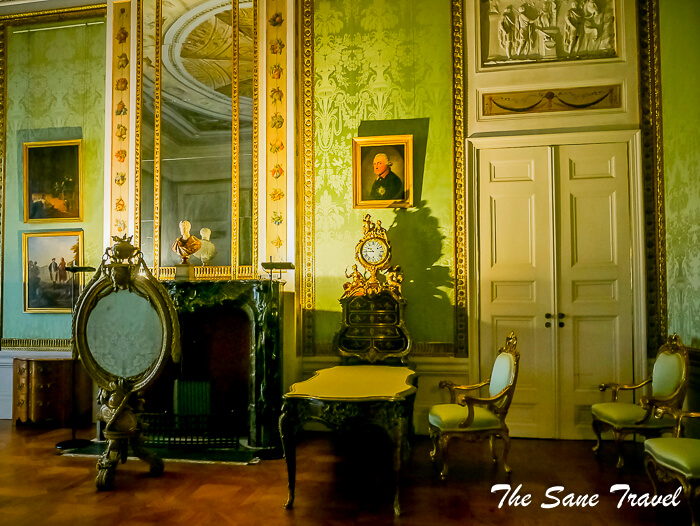
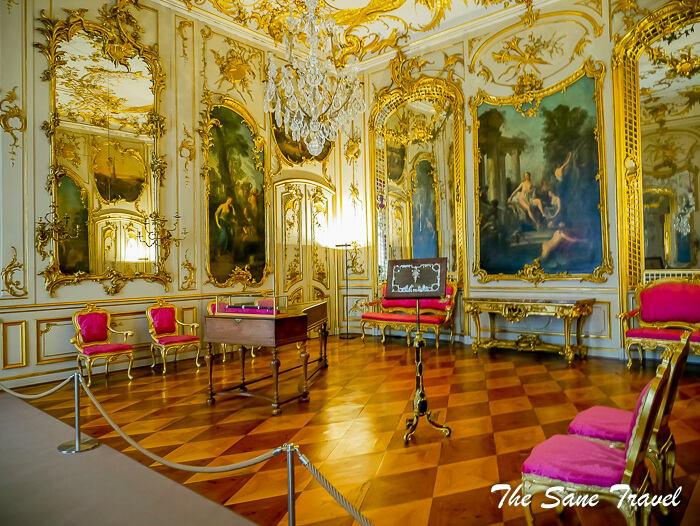
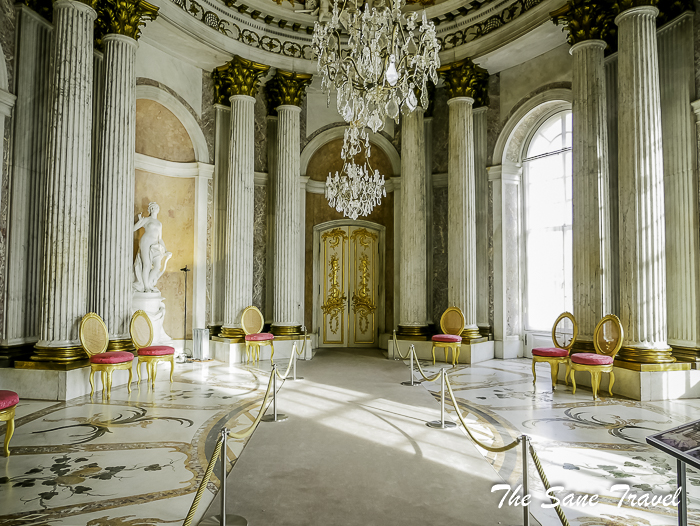
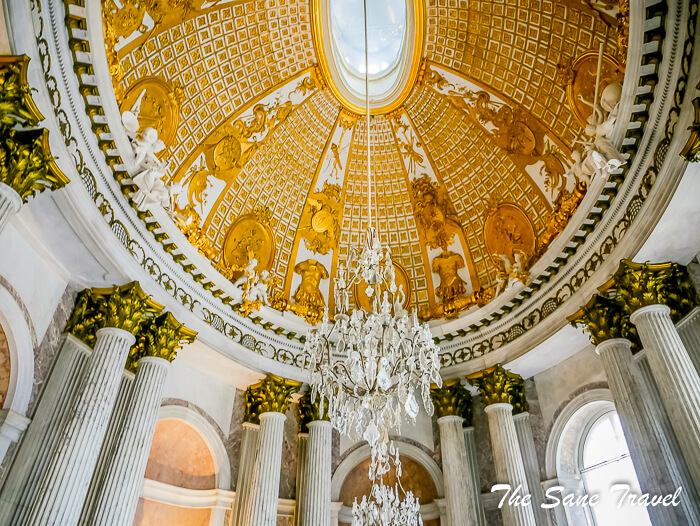
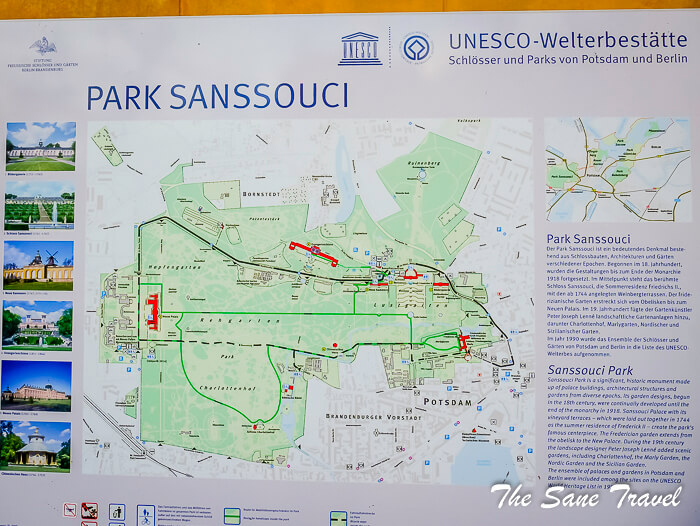
City gates
While walking in the Potsdam, notice its different city gates located around the city. Like all old towns in Germany, Potsdam used to have a sturdy city wall built in the early 18th century. It was to prevent desertions of soldiers and to ease the collection of taxes. Several gates and a few short sections of the wall still stand.
Brandenburg Gate
Not to be confused with the famous Brandenburg Gate in Berlin, this gate in what is now downtown Potsdam is just 3 years older than its famous namesake. It was built in the late 18th century. The reason for the name is the same in both cases: the roads starting at both Brandenburg gates used to lead to the town of Brandenburg. It was designed after the Arch of Constantine in Rome but it sure has its own characteristics. 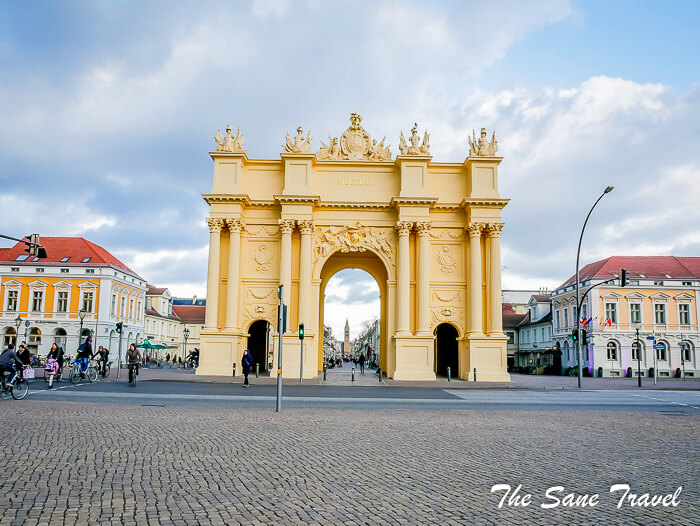
Nauen Gate
The Nauen gate was designed by Johann Gottfried Büring, after an original sketch by King Frederick the Great. It was built in the middle of the 18th century and is one of the first examples of English Gothic Revival architecture in Continental Europe. 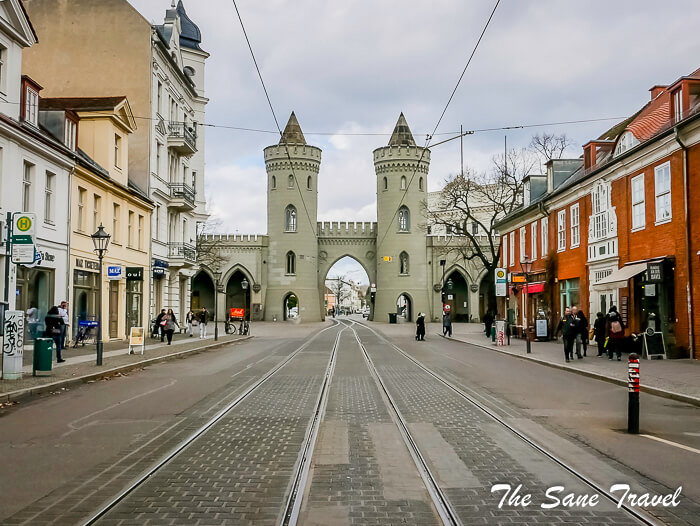
Hunter's Gate
Built in the early 18th century, the Hunter's Gate is the oldest of Potsdam's preserved gates. It is named for the royal hunting grounds that were located right beyond the gate. 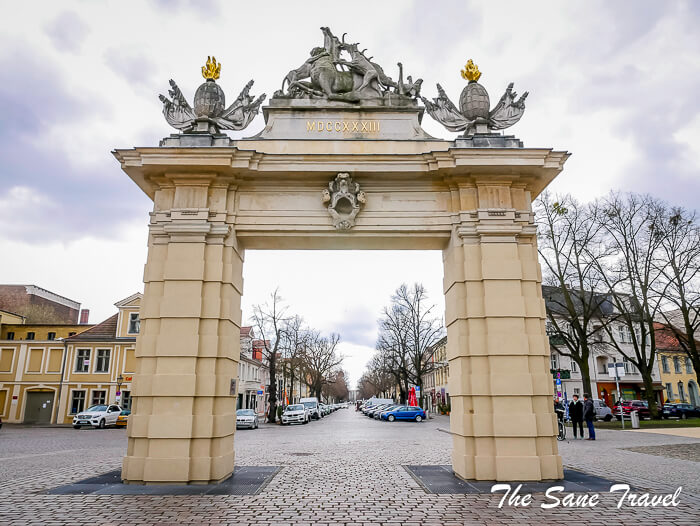
Neustadt Gate
The original Neustadt Gate was built in the middle of the 18th century. It consisted of two obelisks, adorned with Egyptian looking hieroglyphs. The gate was severely damaged in World War II. Only one obelisk survived. It was restored in 1981 and was placed near the original location of the gate. 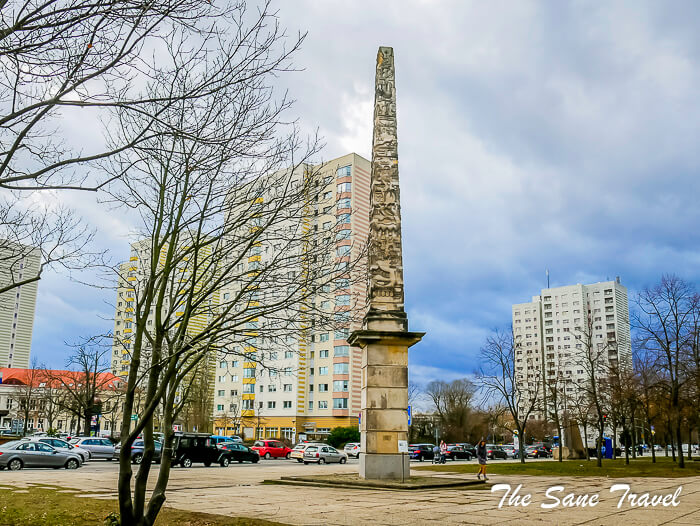
After seeing the incredible sights of Potsdam, you deserve dinner at the Flying Dutchman restaurant.
The Flying Dutchman restaurant
Have a pleasant dinner at Zum Fliegenden Holländer, a historic restaurant-tavern in the Dutch Quarter. Many years ago restaurateur A. Seifert created a new gastronomic quality in the Dutch quarter and Gastronomy Company obtained the face to be recognized with its classic façade with the name of "Flying Dutchman."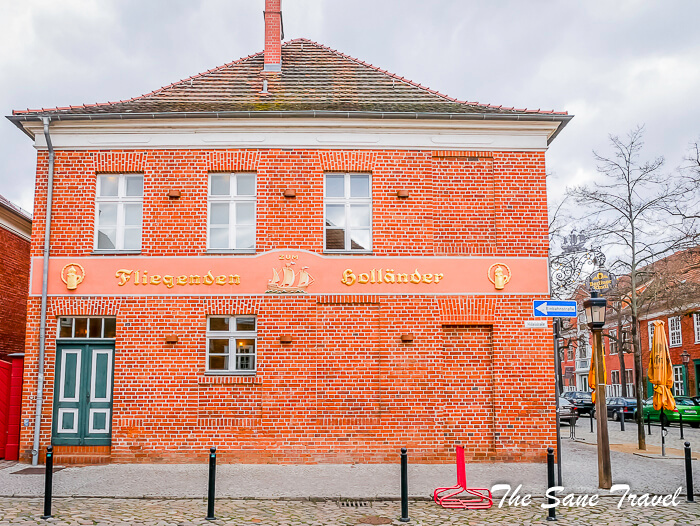
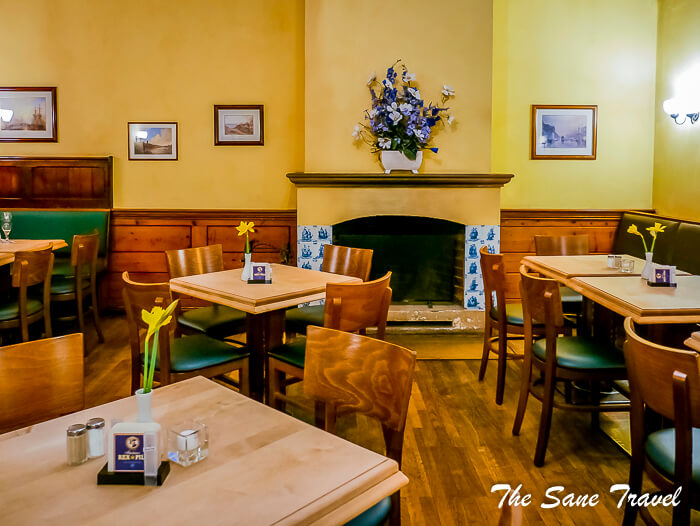
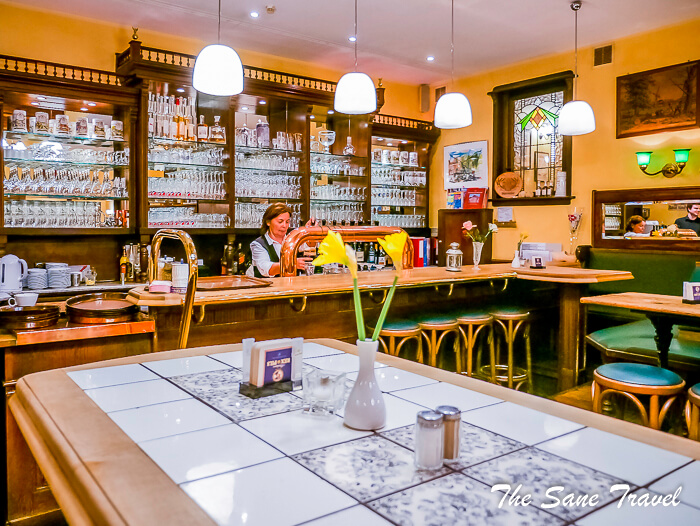 When ordering, remember that portions in Germany are big, with Flying Dutchman being no exception.
When ordering, remember that portions in Germany are big, with Flying Dutchman being no exception.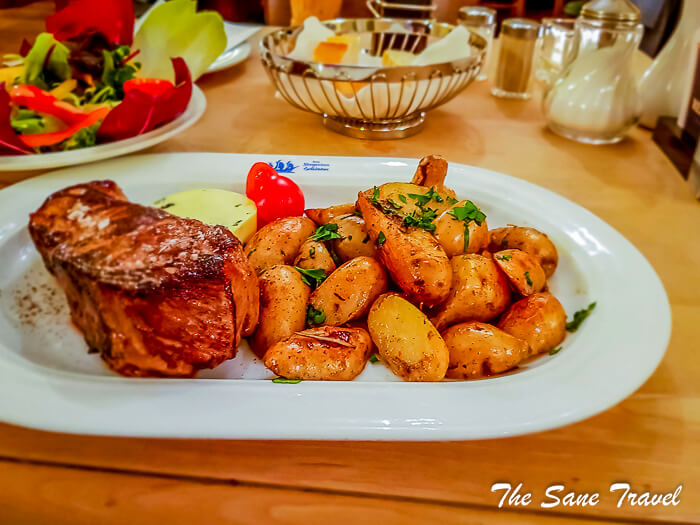 By the way, did you notice an elephant? Look there it is, under the table!
By the way, did you notice an elephant? Look there it is, under the table!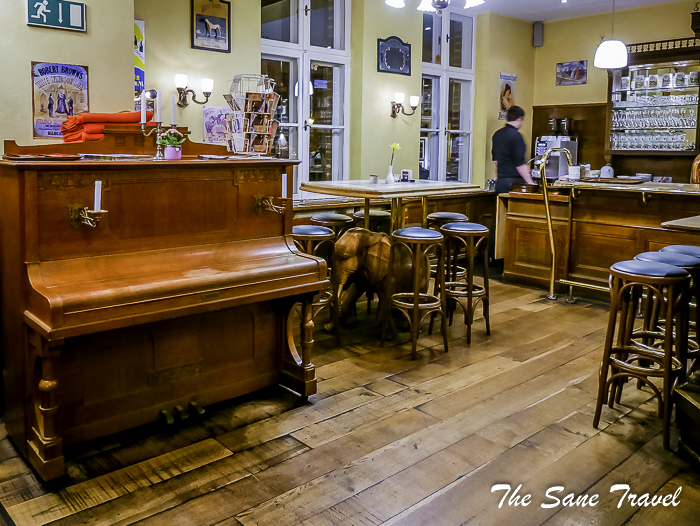 There are still many places to see in Potsdam so why not stay there overnight and see more the following day.
There are still many places to see in Potsdam so why not stay there overnight and see more the following day.
Your hotel in Potsdam: Am Großen Waisenhaus
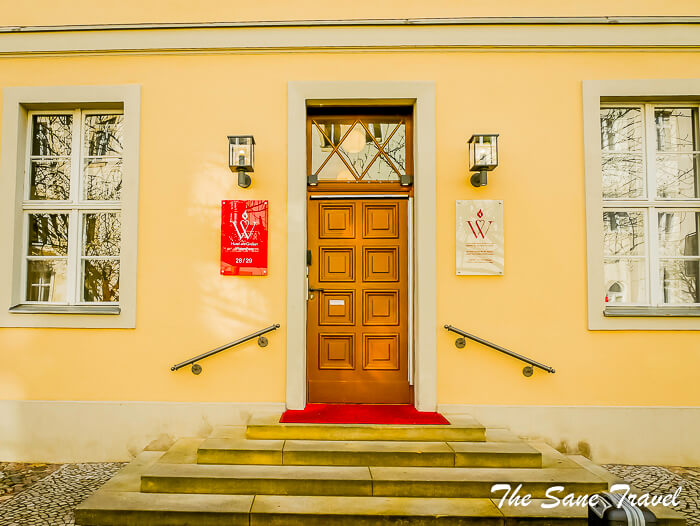 Even though I am not a big breakfast eater, if there is just one reason to stay at Am Großen Waisenhaus, it is breakfast. The choice and taste of it is incredible.
Even though I am not a big breakfast eater, if there is just one reason to stay at Am Großen Waisenhaus, it is breakfast. The choice and taste of it is incredible.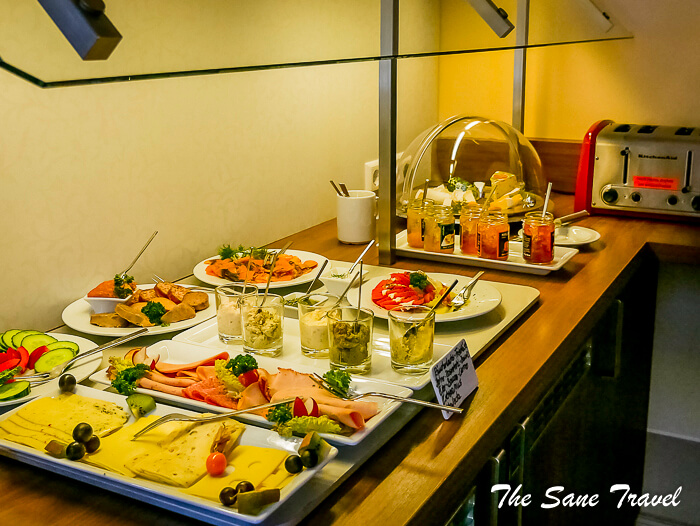 What I liked most of all were wafers with raspberries.
What I liked most of all were wafers with raspberries.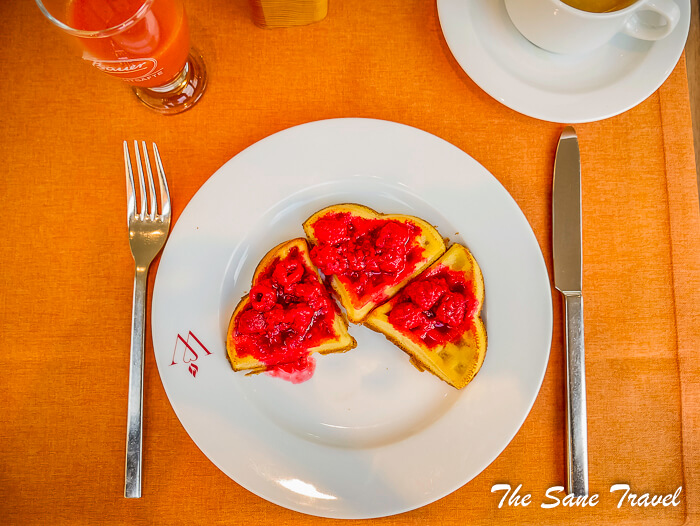 It was the first hotel breakfast room where I saw two fresh juice making machines: one for oranges and the other for other fruits, not to mention a coffee machine that I just love.
It was the first hotel breakfast room where I saw two fresh juice making machines: one for oranges and the other for other fruits, not to mention a coffee machine that I just love.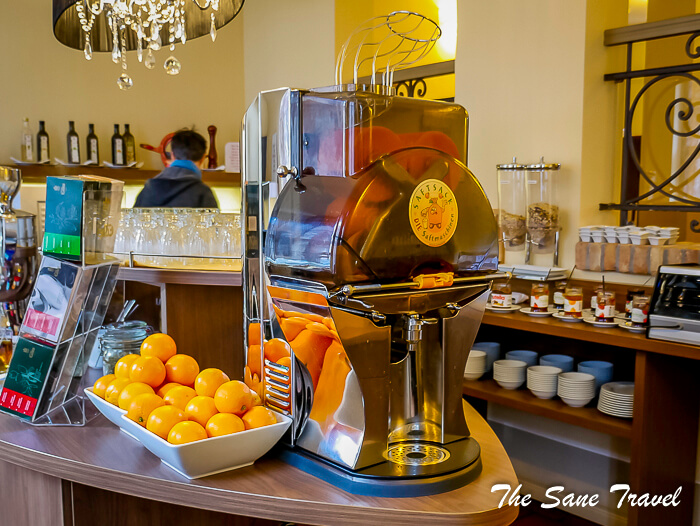
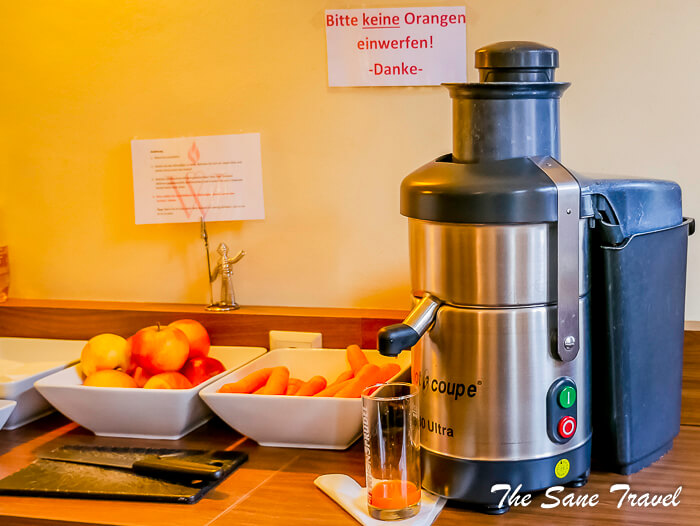
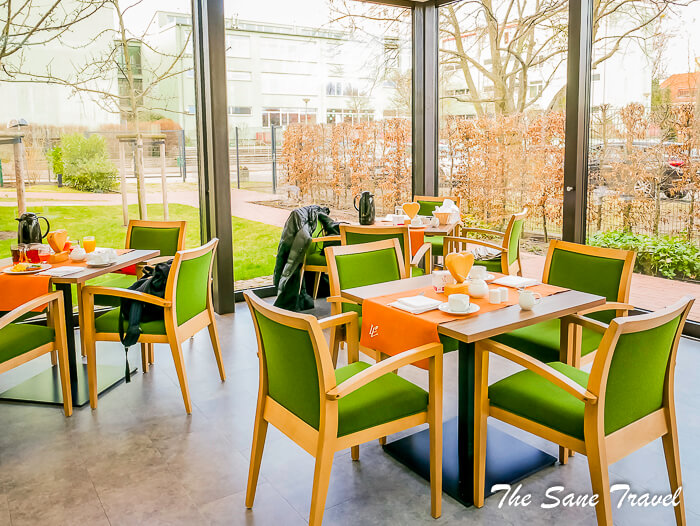 The other thing that appealed to me very much in this hotel was the size of the room. My room was 37 sq. meters.
The other thing that appealed to me very much in this hotel was the size of the room. My room was 37 sq. meters.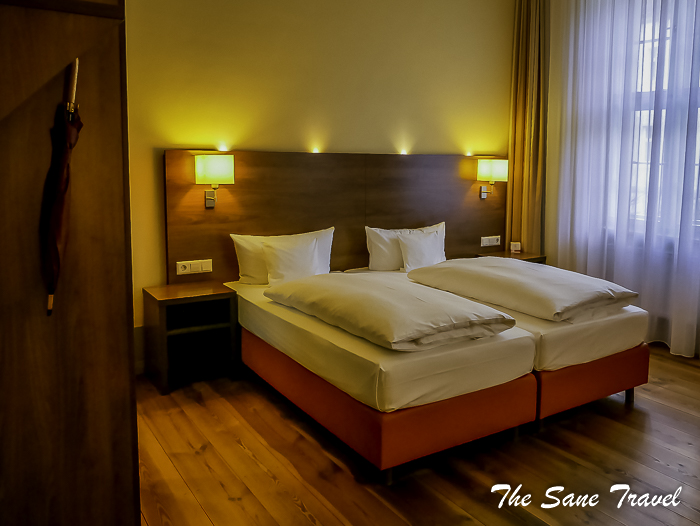
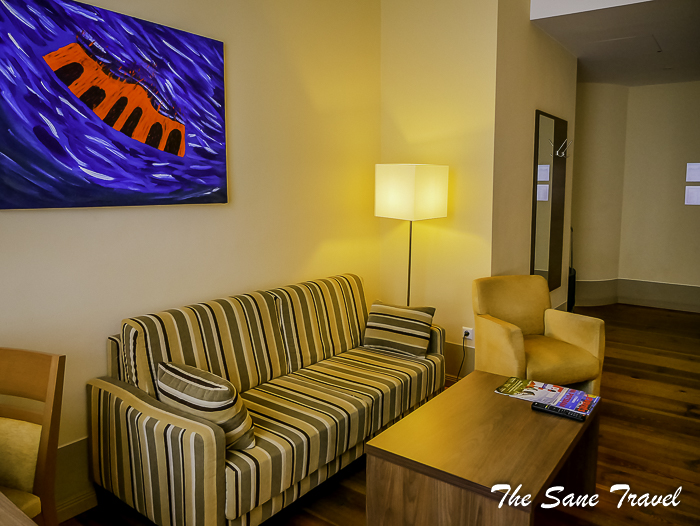 You could dance in it! The building of the current hotel was originally built as a ‘barracks for married soldiers’ 250 years ago.
You could dance in it! The building of the current hotel was originally built as a ‘barracks for married soldiers’ 250 years ago.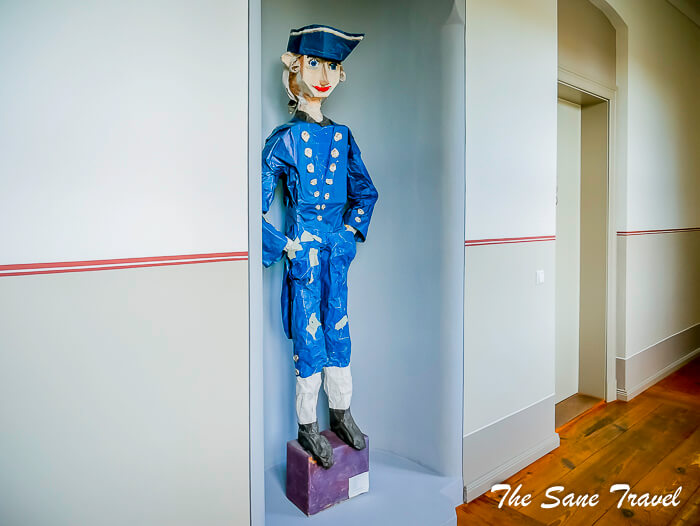 The premises were taken over in the early 19th century by the Great Potsdam Orphanage and converted into a hospital for the orphans. To this day, the building is owned by the charitable foundation Grosses Waisenhaus zu Potsdam. The hotel also offers training to young people in the early steps of their career ladder.
The premises were taken over in the early 19th century by the Great Potsdam Orphanage and converted into a hospital for the orphans. To this day, the building is owned by the charitable foundation Grosses Waisenhaus zu Potsdam. The hotel also offers training to young people in the early steps of their career ladder.
Practical information
Choose your days of visiting Potsdam wisely. Avoid Mondays and Tuesdays if you can because some palaces and other sights might be closed on these days. If you visit palaces in the summertime, buy your ticket on the Internet in advance. Sanssouci and Cecilienhof palaces may be visited only as part of guided tours at certain times and the number of visitors in each tour is quite limited so secure your place in advance. To take photos in palaces, you have to buy a photography permit. Keep it; it is valid in all palaces. For more information to plan your travels, visit Potsdam Tourism and Brandenburg Tourism websites. Want to explore more? Check these exciting day trips from Berlin!
Disclaimer: This article is based on my press trip experience to Potsdam. I was kindly invited by the TMB Tourismus-Marketing Brandenburg GmbH. As always, all opinions and thoughts are my own. I had a great time and I wish you the same! Happy travels!
Like it? Pin it!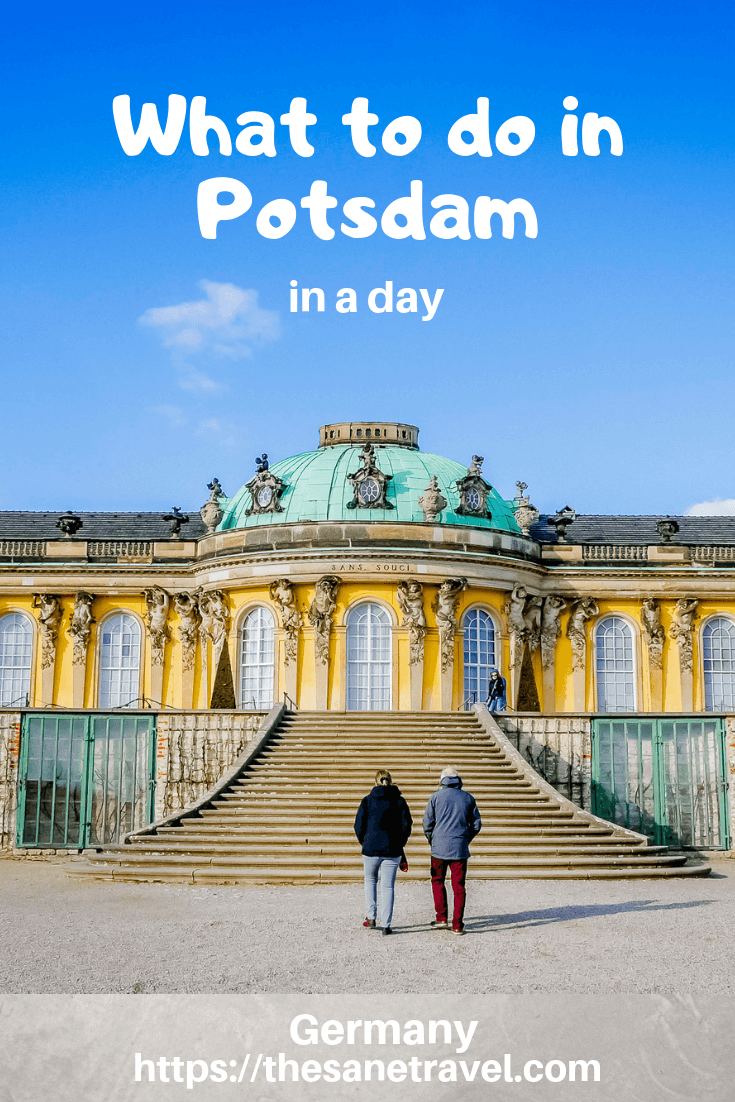
What did you think? Have you been to Potsdam? Or perhaps you’re thinking of visiting there in the near future? Either way, I’d love to hear from you so please add your comments below.
Author: Anita Sāne
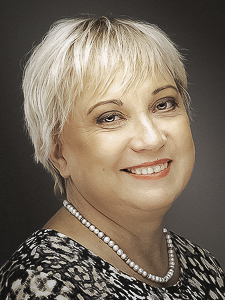
About the author
Anita is a part-time traveller, passionate photographer and a retired career woman from Latvia, travelling mostly solo for more than 15 years. She is a skilled travel planner who plans and executes her travels by herself. Anita wants to show you how to travel the world and open your mind to new experiences. Follow her on Facebook, Instagram, Pinterest, Twitter and Bloglovin.

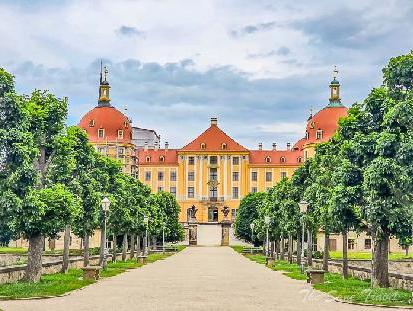
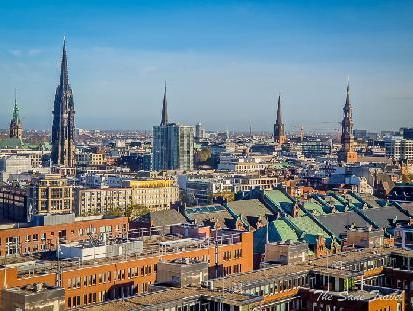
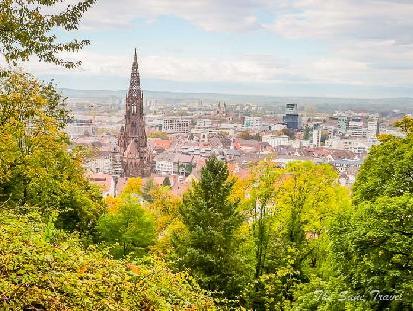
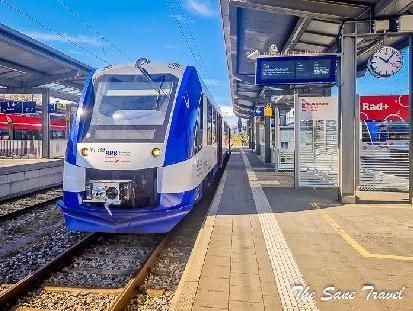
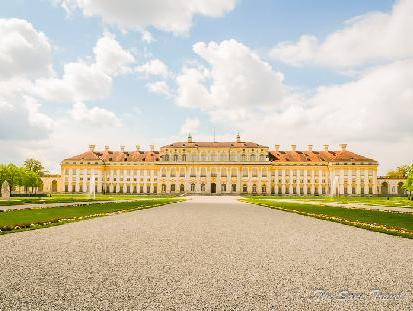
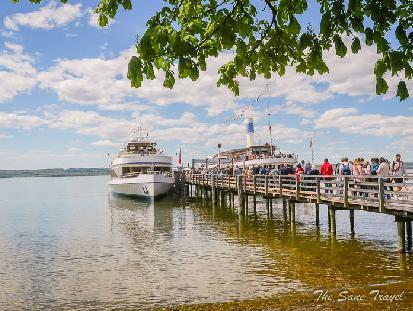
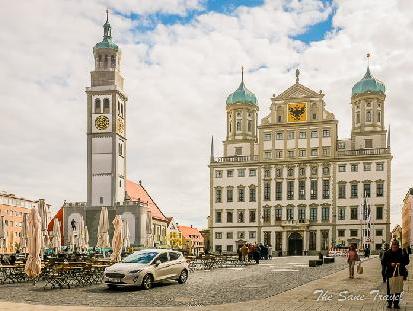
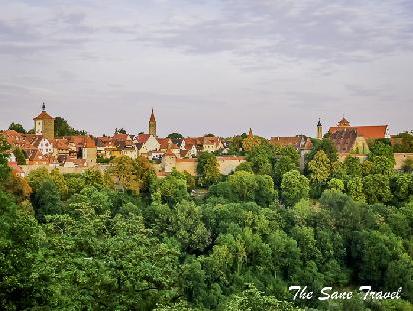
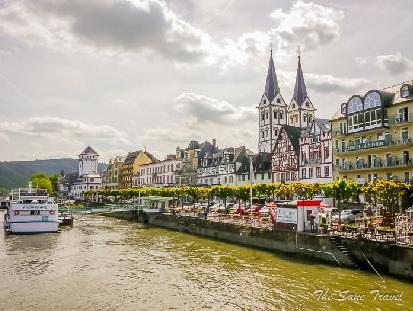
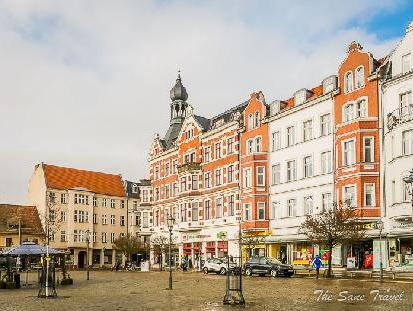
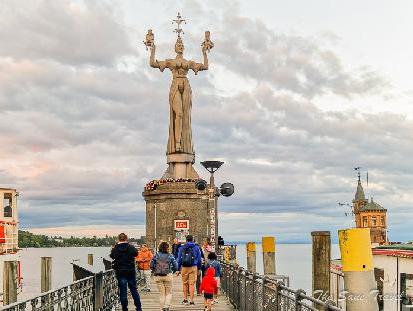
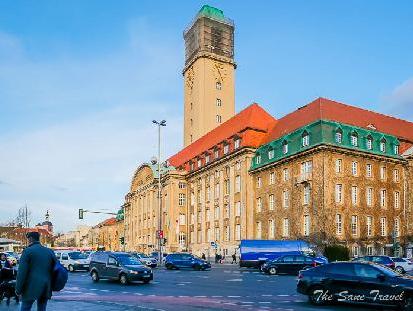

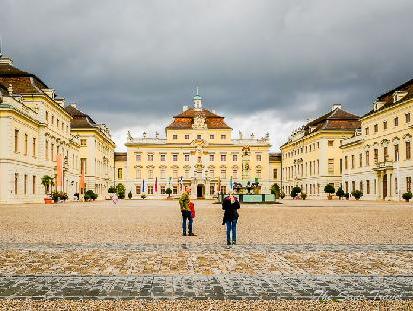
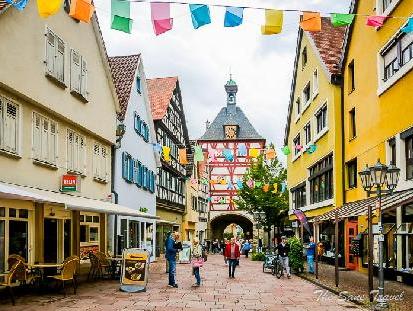
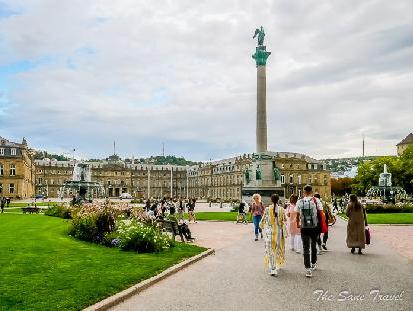
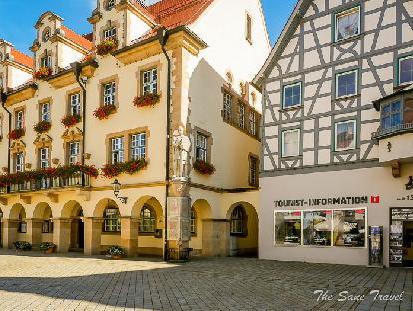
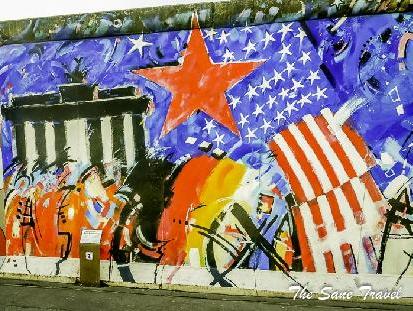
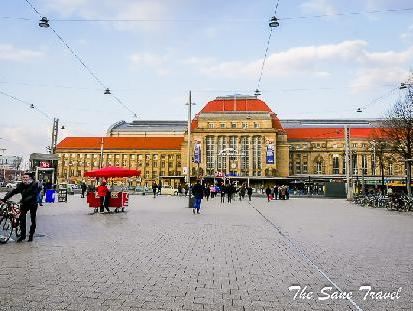
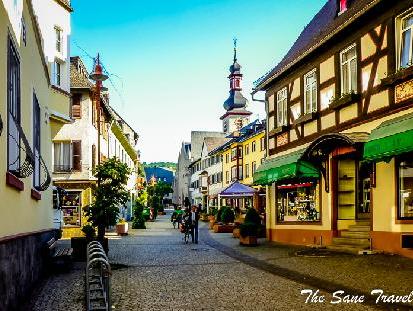
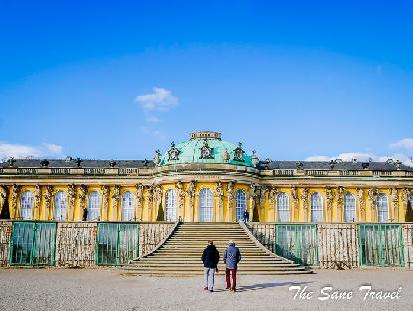
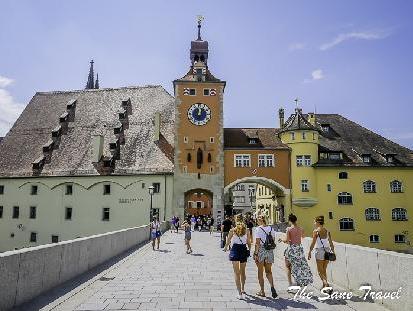
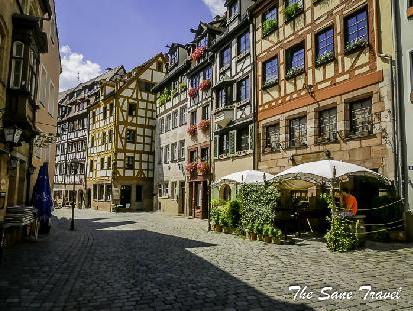
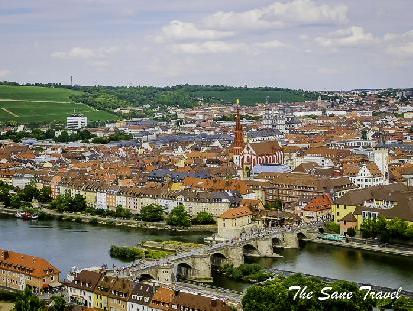
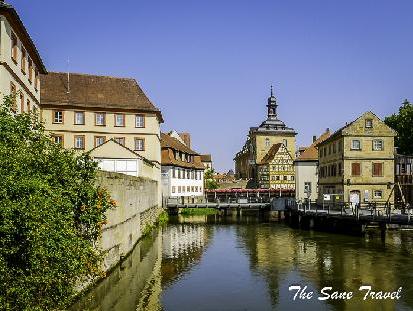
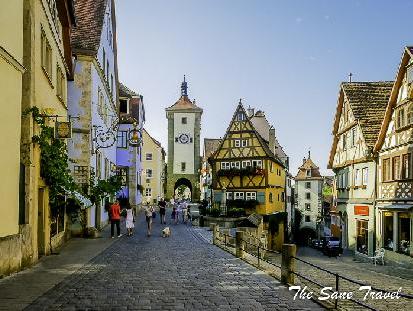
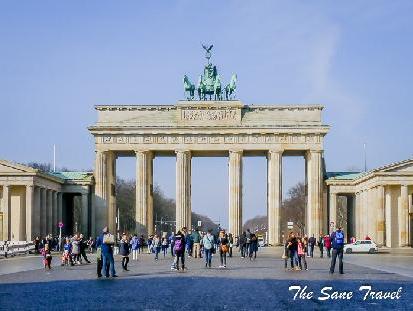

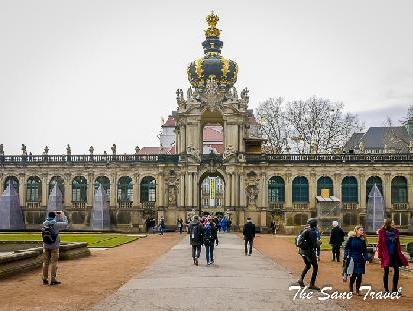
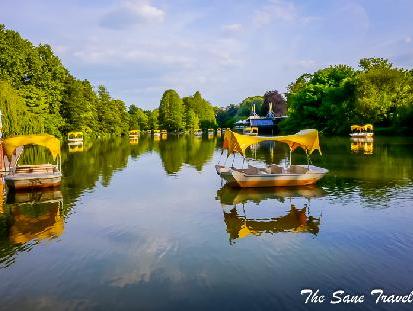
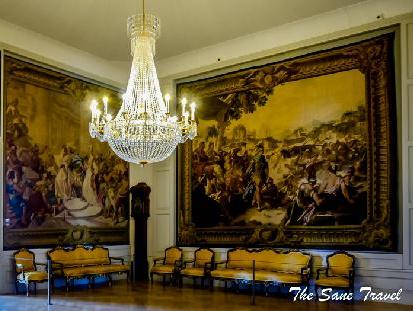
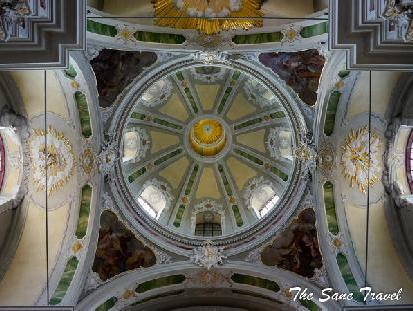
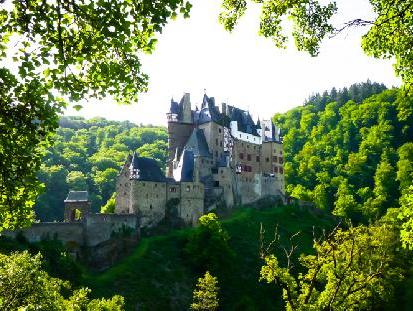
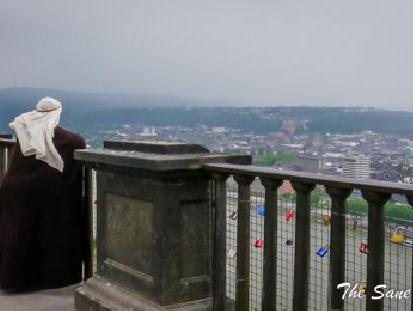
Report
My comments